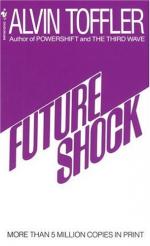
|
| Name: _________________________ | Period: ___________________ |
This test consists of 15 multiple choice questions and 5 short answer questions.
Multiple Choice Questions
1. What is the result of too much change?
(a) Anorexia.
(b) Manic depression.
(c) Aggression.
(d) Lethargy and apathy.
2. What does Toffler say helps consolidate each identity?
(a) Rituals.
(b) Assemblies.
(c) Unique currency.
(d) Heroes.
3. What does Toffler propose in order to institute his plan to protect against future shock?
(a) A government based on wisdom and ancient principles.
(b) A public agency to review new technology.
(c) A political party for restricting technological research.
(d) A party of revolutionaries to overthrow technological workers.
4. How does Toffler describe a person's choices in the future?
(a) Abundant.
(b) Eliminated.
(c) Compelled.
(d) Limited.
5. What tools will be necessary to determine whether changes should be allowed?
(a) Social networking tools.
(b) Structural modeling tools.
(c) Cost benefit analysis tools.
(d) Communication protocols.
6. What has social change created, in Toffler's account?
(a) Slavery.
(b) Overchoice.
(c) Unfreedom.
(d) Revolutionary consciousness.
7. What does Toffler say groups have to do?
(a) Compete.
(b) Change.
(c) Remain the same.
(d) Restrain the adaptive urge.
8. What is the behavioral consequence of the psychological effects of change?
(a) Crime.
(b) Art.
(c) Depression.
(d) Drug use.
9. What fields will spur the movement that affects choice in the future?
(a) Religion.
(b) Technology.
(c) Politics.
(d) Industry.
10. What would one benefit of government involvement in change management be?
(a) Measuring the long-term effects of change.
(b) Harnessing more profit from each change.
(c) Distributing the wealth more equitably.
(d) Eliminating future problems.
11. How has the grouping of adults changed in recent times, according to Toffler?
(a) Demographics have focused on regions, not ages.
(b) Marketers have identified overlapping interests between different age groups.
(c) Demographic analysis has taken a holistic approach of all ages as interrelated.
(d) There are more age groups.
12. What will be the benefit of a set of descriptive indices?
(a) They could create a standard for technological change.
(b) They could quantify the profitability of new technology.
(c) They could quantify the effect of change.
(d) They could help calibrate one culture with another.
13. What does change affect in a person's psychology?
(a) Their decision-making process.
(b) Their ability to orient themselves in time and space.
(c) Their ability to acquire language.
(d) Their ability to solve problems.
14. What is the danger in society's rate of change, in Toffler's opinion?
(a) That it might create a new split between classes.
(b) That it might create the opportunity for totalitarianism.
(c) That it might leave certain classes behind.
(d) That it might be faster than man can handle.
15. What measure would Toffler like to be able to use on society?
(a) A measure of a people's happiness.
(b) A measure of a people's real misery.
(c) A measure of a people's resiliency.
(d) A measure of the livability of a country.
Short Answer Questions
1. What is NOT a symptom of future shock?
2. What organizations does Toffler cite as an example of an organization that mitigates future shock?
3. What did Holmes and Rahe find in their study?
4. What will happen if preventative steps are not taken, in Toffler's account?
5. What do "subcults" give the people who belong to them, in Toffler's account?
|
This section contains 539 words (approx. 2 pages at 300 words per page) |

|




